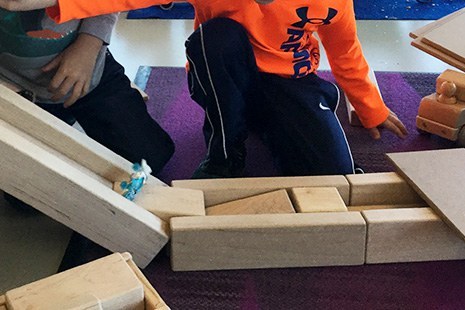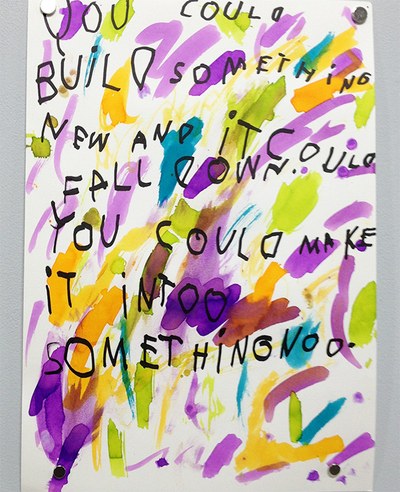Posted: August 22, 2023
In March, Better Kid Care launched the course "Find Fun and Meet Standards with Emergent Curriculum." It has been fun for our author team to hear from educators around the globe about what is emerging in their minds as they have worked through the course.

Two children peeking out of a cardboard box.
One educator said, "I think I am going to look more to the kids for what direction we will take. I will still write a lesson plan but be a little more loose with it." A second teacher commented, "This course has inspired me to think outside of the box—to exercise creativity in following children's interest and build off of them. This course has reminded me that children can learn so much from having an open-ended curriculum as opposed to following preset lesson plans and/or themes to follow." Another educator wants to allow more time, sprinkled throughout the day, for children's questions.
It takes courage to give more control to the children, but it is so worth it!
One educator suggested a simple modification: simply continue with the current lesson plan until the interest fades. The team can move ahead with other plans that are listed in the classroom forms, but simply "copy and paste" the plan to be continued from this day or week into the future plan while children continue to pursue the play that started with this schedule.

What if your children were completely captivated building ramps and exploring movement? How might you support and extend this exploration of physics concepts?
A learner commented that when the children see that their questions are leading to whole discussions, they will realize how much their thoughts are valued by the adults and will do it more! As an example, one teacher decided to let the children decide what materials go in the sensory table for exploration. Another shared that during a planned craft activity where they were making bird nests out of art material scraps, at a child's suggestion the teachers let children not only put in the planned hatchling but also mommy and daddy birds as they wished. This one simple, responsive move allowed children’s ideas to be pursued! Great!
A pre-K teacher mused, "I'm thinking about how to marry the expectations of standards and prescribed curriculum with the philosophies of emergent curriculum. With an all-day Pre-K, I'm thinking that the morning could be used to cover what is expected and the afternoons could be used to explore what is interested or desired."

Most states have established early learning standards to guide the work of ECE/OST educators. In Pennsylvania, these include competencies for preschoolers like the child will "use senses to learn and explore from the environment…actively explore new materials" (OCDEL, 2014, p. 11), "attempt to complete a task in more than one way" (OCDEL, 2014, p. 13), "begin to use new vocabulary when asking questions or describing situations" (OCDEL, 2014, p. 22), "sort and order items” (OCDEL, 2014, p. 38), and "express feelings…and show pride in accomplishments" (OCDEL, 2014, p. 79). All these and hundreds of other competencies can easily be met through the play that emerges from children's intrigues.
Not all ECE/OST staff are working in programs where emergent learning plans are supported. Some wrote that their plans "never change based on the day's activities. There are no penciled-in areas." Another wrote, "I wish my directors would allow us to plan according to the children's likes and interests." If this is your situation, what options might you have? If you are feeling boxed in, what steps might be available to you to create some more professional freedom and joy?
Let your director know that you have a question, that you've noticed children being really interested in a particular thing and you're wondering what you need to know as you pursue this interest with them. For example, "The kids are super interested in all the sticks that have fallen in the play yard after last week's rainstorm. I'm thinking about brainstorming with them about how we could play with them. What do I need to know before I invite their ideas?"
Directors

Is there a chance that your staff doesn't feel your permission to personalize learning experiences according to the interests and skill levels of the children in their care? Educators who carry out developmentally appropriate practices (DAP) intentionally identify and appreciate each child's unique abilities (LaForett, Halle, & Vivrette, 2023). How can you encourage your staff to observe and support the interests and abilities that the children are demonstrating? Try saying something like, "I saw how excited the children were watching the rabbit on the playground yesterday. It could be really fun to explore that interest more with them. Do you need some help to do that?" or "Your group just loves to jump! How are you feeling about giving them enough experiences where they can really do that with enthusiasm?"
An administrator who completed the course wondered if the observations would be difficult for staff. If your staff struggle with that aspect of the job, try encouraging them once a day to pause for five minutes, watch a specific child or area of the room, and simply answer the question, "What are you noticing?" and write that down. Observation skills get better with practice. Directors can really encourage staff by asking them what they have been noticing recently in their classrooms.
When it comes to programming decisions, no single choice is right for everyone, but summer is often a good time for teams to re-evaluate and consider how to make jobs more enjoyable for the employees who are in them. This job crafting handout can be a tool for supervisors to work through with staff. Just like with children, it is important to ask a curious question with your colleagues or staff. Then listen to the response. Listen to what is shared! Is a lid opening? A wall coming down? What box do they want to get out of? What’s outside the box that you’ve been working in? Bet it’s something exciting! Check it out!
One relieved educator commented after completing the course, "I am happiest to find out that all those post-it notes that I use making last minute changes to my lesson plans are totally acceptable!!" Finally, this educator said it best, "There is so much that kids will run with and ask questions about if we as teachers give them the tools to do so." Go ahead! Step outside the box.
References
LaForett, D.R., Halle, T., & Vivrette, R. (2023). Research shows how developmentally appropriate practice helps early childhood educators support all children. Child Trends. Doi.org/10.56417/1805i6586q
Office of Child Development and Early Learning (OCDEL). (2014). Pennsylvania Learning Standards for Early Childhood: Pre-Kindergarten. Pennsylvania Departments of Human Services and Education.
Image credits
- Shannon Clarke, Kansas City, MO
- Ideas Studio, Bloomsburg, PA in a community art show about mistakes at The Exchange.
- Northampton Community College, Reibman Children's Center, Bethlehem, PA

